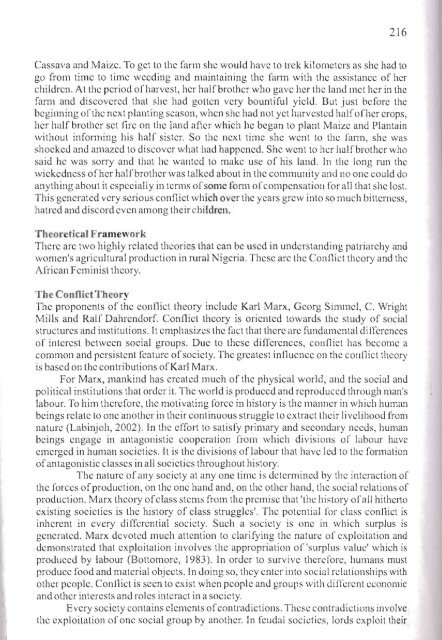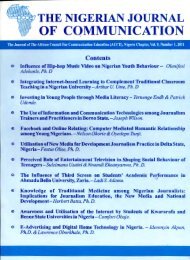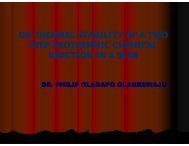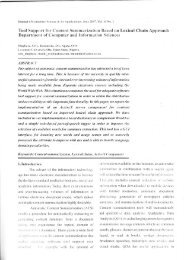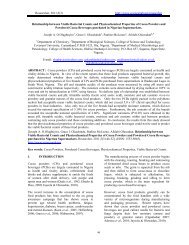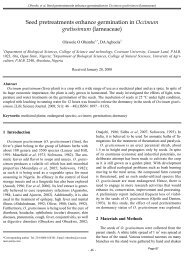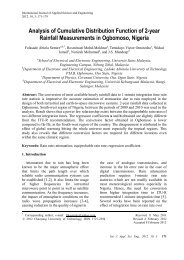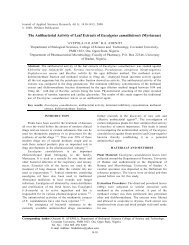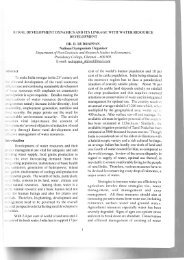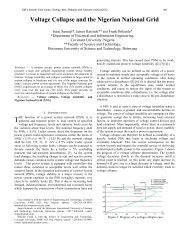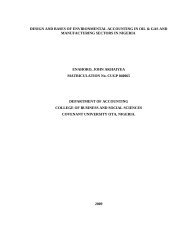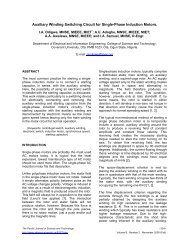Download (8Mb) - Covenant University Repository
Download (8Mb) - Covenant University Repository
Download (8Mb) - Covenant University Repository
You also want an ePaper? Increase the reach of your titles
YUMPU automatically turns print PDFs into web optimized ePapers that Google loves.
216<br />
Cassava and Maize. To get to the farm she would have to trek kilometers as she had to<br />
go from time to time weeding and maintaining the fann with the assistance of her<br />
children. Atthe period ofharvest, her halfbrother who gave her the land met her in the<br />
farm and discovered that she had gollen very bountiful yield. But just before the<br />
beginning ofthe next planting season, when she had not yet harvested halfofher crops,<br />
her half brother set fire on the land after which he began to plant Maize and Plantain<br />
without infonning his half sister. So the next time she went to the farm, she was<br />
shocked and amazed to discover what had happened. She went to her halfbrother who<br />
said he was sorry and that he wanted to make use of his land. In the long run the<br />
wickedness ofher halfbrother was talked about in the community and no one could do<br />
anything about it especially in terms ofsome form ofcompensation for all that she lost.<br />
This generated very serious conflict which over the years grew into so much bitterness,<br />
hatred and discord even among their children.<br />
Theoretical Framework<br />
There are two highly related theories that can be used in understanding patriarchy and<br />
women's agricultural production in rural Nigeria. These arc the Conflict theory and the<br />
African Feminist theory.<br />
The Conflict Theory<br />
The proponents of the conflict theory include Karl Marx, Georg Simmel, C. Wright<br />
Mills and Rail' Dahrendorf. Conflict theory is oriented towards the study of social<br />
structures and institutions. It emphasizes the fact that there arc fundamental differences<br />
of interest between social groups. Due to these differences, conflict has become a<br />
common and persistent feature ofsociety. The greatest influence on the conflict theory<br />
is based on the contributions ofKarl Marx.<br />
For Marx, mankind has created much of the physical world, and the social and<br />
political institutions that order it. The world is produced and reproduced through man's<br />
labour. To him therefore, the motivating force in history is the manner in which human<br />
beings relate to one another in their continuous struggle to extract their livelihood from<br />
nature (Labinjoh, 2002). In the crfort to satisfy primary and secondary needs, human<br />
beings engage in antagonistic cooperation from which divisions of labour have<br />
emerged in human societies. It is the divisions oflabour that have led to the formation<br />
ofantagonistic classes in all societies throughout history.<br />
The nature ofany society at anyone time is determined by the interaction of<br />
the forces ofproduction, on the one hand and, on the other hand, the social relations of<br />
production. Marx theory ofelass stems from the premise that 'the history ofall hitherto<br />
existing societies is the history of class struggles'. The potential for class connict is<br />
inherent in every differential society. Such a society is one in which surplus is<br />
generated. Marx devoted much attention to clarifying the nature of cxploitation and<br />
demonstrated that exploitation involves the appropriation of 'surplus value' which is<br />
produced by labour (Bottomore, 1983). In order to survive therefore, humans must<br />
produce food and material objects. In doing so, they enter into social relationships with<br />
other people. Conniet is seen to exist when people and groups with difrcrent economic<br />
and other interests and roles interact in a society.<br />
Every society contains elements ofcontradictions. These contradictions involve<br />
the exploitation ofone social group by another. In feudal soeicties, lords exploit their


